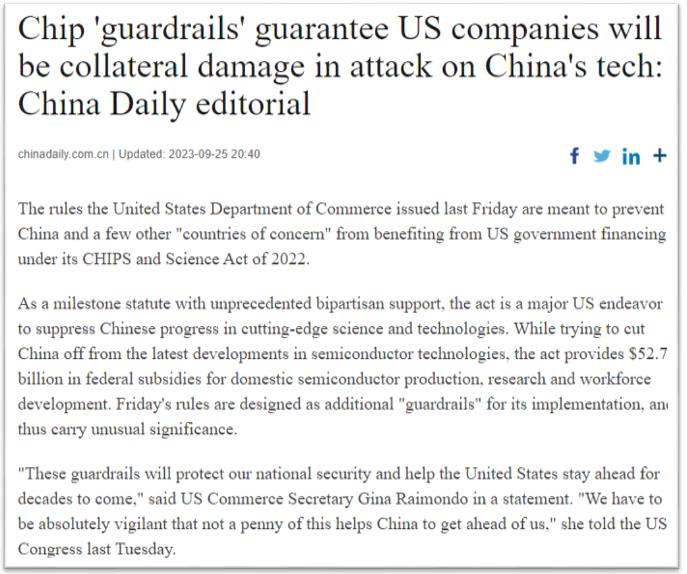And the United States "Chip Act" plus "guardrail" rules: can not prevent China from catching up, but can stop the progress of the United States

Last Friday, the U.S. Department of Commerce announced the final implementation details of the Chip and Science Act of 2022 (referred to as the Chip Act), aiming at preventing the semiconductor industry in China and other concerned countries from benefiting from it.
The Chip Act of the United States was promulgated in 2022, which injected a total of $52.7 billion in financial support for the production, R&D and personnel training of the semiconductor chip industry in the United States. The bill is an important measure for the United States to suppress the development of cutting-edge technology in China and prevent China from acquiring the latest semiconductor technology. Last Friday’s implementation details provided a "guardrail" for the implementation of the US Chip Act.
In response, US Secretary of Commerce Raymond said in a statement: "These guardrails will safeguard our national security and help the United States lead its competitors in the coming decades." She also said at the hearing of the US Congress last Tuesday: "We must be extra careful to ensure that every penny of the United States is not used by China to develop their technology and catch up with us."
In the published detailed rules, American enterprises that are required to receive federal subsidies are prohibited from significantly improving their semiconductor manufacturing capabilities in concerned overseas countries for a period of 10 years. The new regulations also require that in certain fields, the recipients of subsidies shall not cooperate with entities in concerned countries in research or technology transfer.
Earlier, the United States has tightened chip exports and technology transfer, and issued investment restrictions. All kinds of measures are aimed at preventing other countries from benefiting from American technology, business contacts and investment. At this stage, the restriction of the United States has indeed brought a lot of trouble to leading enterprises in China such as Huawei, and the shortage of chips has become a thorny issue in many industries.
However, it is too one-sided to think that China has taken advantage of American technology, or that only by suppressing China enterprises can American national security be maintained.
The U.S. government keeps cracking down on China’s semiconductor industry, and it’s not just China enterprises that are affected: about one-third of American enterprises’ income comes from China, so the U.S. government’s excessive behavior is opposed by American business circles. Compared with the hawks against China in the US government, American enterprises are more aware that excessive behavior against China will only disrupt the supply chain and weaken the global competitiveness of American enterprises. They also know that China’s strong market vitality can not only bring them profits, but also catalyze technological innovation and application, which is unmatched by other countries.
Therefore, it is unrealistic to block China’s development by various means, because it is impossible for the United States to completely monopolize the global technology market, and it is even more impossible for China’s technology to fall behind forever.
This article is translated from the August 25th editorial of China Journal.
Original title: chip’ guard rails’ guarantee us companies will be cooperative damage in attack on China’s tech.